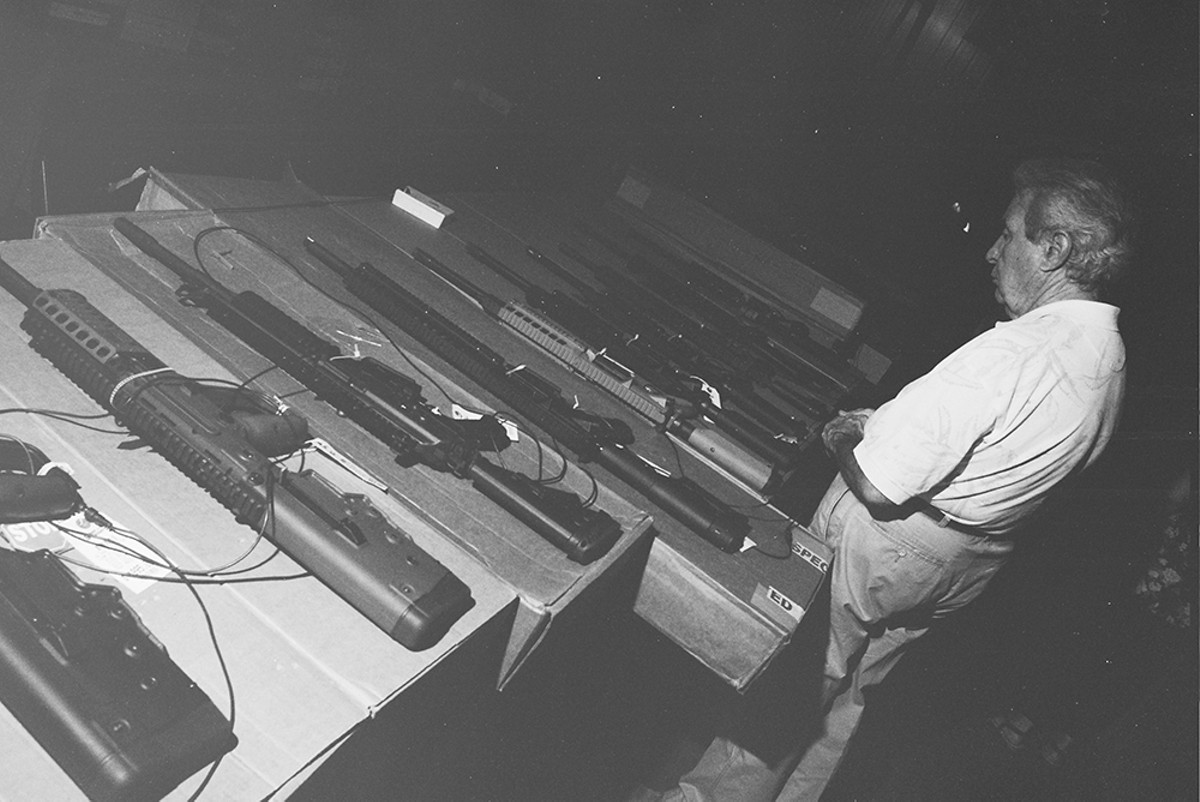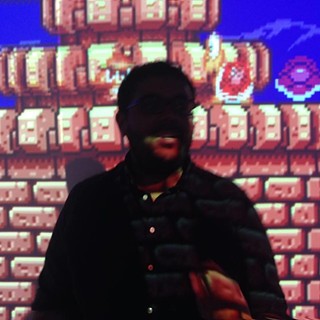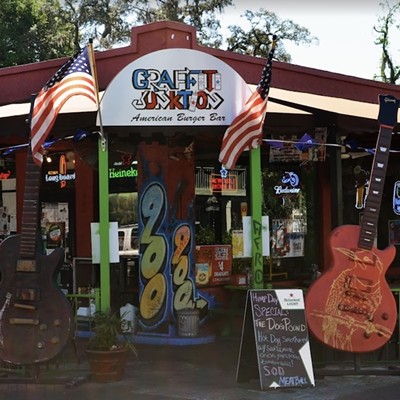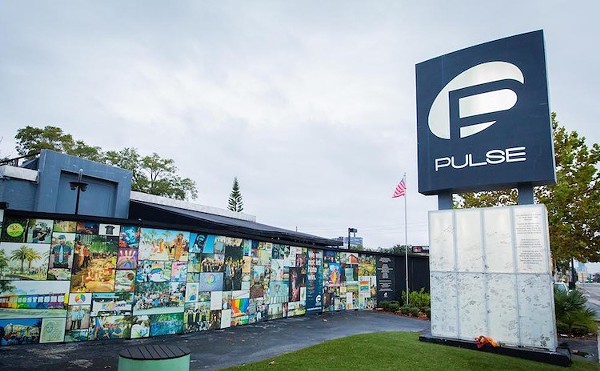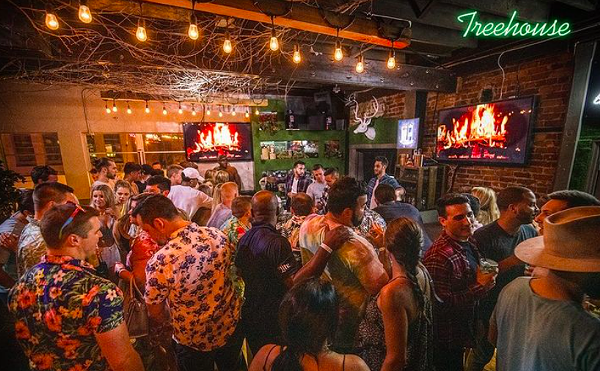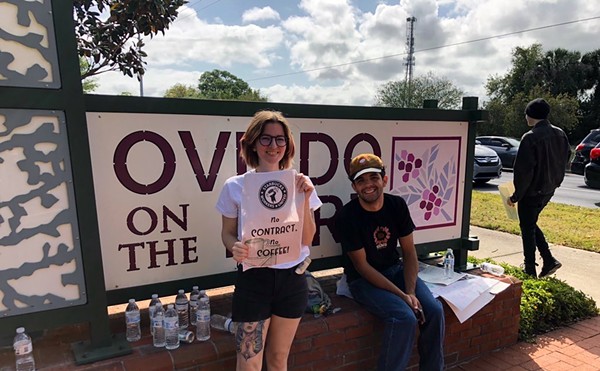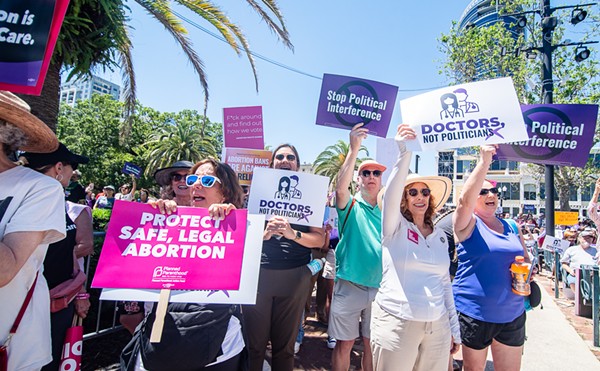The inviting aroma of barbecue wafts past rounds of golden ammo at the exhibition hall of the Central Florida Fairgrounds. Fifty-four-year-old Pinellas County resident Chris Rhubottom and his son are standing in the middle of the bustling room while shoppers swarm the Orlando stop of Florida Gun Shows on May 20.
Editor's note: This story has been updated; see end of story for clarification.
Some are perusing federally licensed stands. Others carry rifles with price tags attached to them, ready to take part in the so-called "gun show loophole" that allows private citizens to sell their firearms at events like this one without a paper trail.
"His name is C.J.," Rhubottom says, gesturing toward the antsy 7-year-old next to him. "He has an AR-15. He shoots for entertainment."
The atmosphere is dominated by paranoia and anti-press sentiment, punctuated with anti-Hillary Clinton merchandise left over from a fiery election season. Mike Williams, a 36-year-old Pine Hills resident there to buy a sling for his AR-15, cites possible riots as reason for his purchases.
"I got four boys at the house, so I gotta make sure they're all right," he says.
Mentions of post-Pulse gun reform are met with variations of the "people kill people" narrative.
"The gun didn't kill everybody. It was a tool," Rhubottom says. Echoing alt-right activist Milo Yiannopoulos' speech in downtown Orlando last June, in which he said the rainbow flag should be emblazoned "Fire Back," Rhubottom says he believes that gay people should take up arms for self-defense in the future, rather than fight to take others' gun rights away.
Michael Wilcox, a 35-year-old salesman for Shoot Straight, the firearms dealer that owns this gun show, says that as a lifelong Orlando resident, the 49 deaths at Pulse last June hit him hard. Still, he argues that bans on high-capacity magazines wouldn't do anything to stop criminals from getting their hands on products already out there.
"Unfortunately, every now and then, in a business like this, some people are going to slip through the cracks," Wilcox says. "And there's nothing you can do about it."
State Rep. Carlos Guillermo-Smith (D-Orlando) disagrees.
"We actually now have lawmakers proactively filing gun safety legislation," he says. "Before they weren't even doing that."
Guillermo-Smith is referring to House Bill 167, which he filed and co-sponsored with eight other Democrats as the session opened this year on Jan. 5. The bill's language would have made the possession of high-capacity magazines and assault weapons by everyday citizens a third-degree felony, punishable by a mandatory minimum of one year in prison, unless the weapon or ammunition was purchased prior to Oct. 1, 2017, and licensed for possession by the state by October 2018. It died in the Criminal Justice Subcommittee in early May. The bill's Senate counterpart, SB 254, co-sponsored by Linda Stewart (D-Orlando), died on the same day.
According to Gallup, gun ownership across the country peaked in the mid-1990s at 51 percent, falling to 39 percent in 2016. However, the number of gun-owning households may have decreased, but the number of firearms in those households doubled in the past 20 years. Data from the FBI criminal background check system showed in November 2016 that gun sales had set new records for 18 straight months.
Also in 2016, 55 percent of respondents said they believed that gun laws ought to be made stricter. After Pulse, the Tampa Bay Times reported on an Americans for Responsible Solutions poll showing that 58 percent of Florida voters are "more likely to vote for a candidate who supports comprehensive gun reform."
But gerrymandering and strong Republican support can make those numbers seem out of reach. Campaign promises of gun reform, which catapulted U.S. Rep. Stephanie Murphy (D-Florida) to victory over Republican incumbent John Mica, have either dissipated from public discourse or been forgotten amid the clamor of national news.
Translating popular support into actual policy isn't easy. Guillermo-Smith faults the gun lobby.
"The [National Rifle Association] is very powerful in Tallahassee," he says. "Republicans are in lockstep with their agenda because they contribute to their campaigns, but also because if they go against the gun lobby, they have a lot of money spent attacking them."
The 2017 Florida legislative session was the first since the Pulse shooting, and it ended in a big win for gun advocates: an expansion of the controversial "Stand Your Ground" law. Under new legislation that shifts the burden of proof, it's now up to the prosecutor to prove the defendant was not standing his ground, rather than up to the defendant to prove that he was. After passing in both the state House and Senate, it is one gubernatorial pen stroke away from becoming law.
"I would say that's a pretty favorable session," says state Sen. Greg Steube (R-Sarasota). "There's no anti-gun bills that even got a hearing at the Senate or the House."
Other bills proposed by Steube, an ardent gun-rights proponent who enjoys a 100 percent rating from the NRA, failed to see the light of day. A bill allowing citizens with concealed weapons permits to sue gun-banning businesses in the event of a shooting failed. Other measures, like concealed campus carry and airport carry – both currently prohibited by state law – also failed to gain traction.
Gun reform activists see those failures as small victories.
"I call that progress," says Maria Wright, who has made it her mission to change the gun laws she says are responsible for her son Jerry's death at Pulse. "It shows the strength of constituents speaking out, sharing their voices and standing up to the gun lobby's agenda."
Steube blames the FBI for not fully exercising their duty to stop guns from reaching people on their terror watch list. But when it comes to banning assault rifles or high-capacity magazines, he doesn't seem to think they cause that much harm.
"How does an assault rifle fire any different than a 9mm handgun?" he asks.
Jason Lindsey, executive director of the Pride Fund to End Gun Violence, thinks comments like that are mere posturing.
"The gun lobby pushes these minute differences," he says. "The lethality is the same. The efficiency is the same. Yet the gun lobby believes those types of weapons are needed to defend yourself."
An ideological fault line seems to be at the center of disagreements on gun legislation. Talking points on both sides present polar-opposite views on how to best keep people safe. One side thinks they add to the problem; the other sees them as a necessity for law-abiding citizens who may need to take matters into their own hands, especially where law enforcement can be slow to respond. Steube made clear he stands on the latter side when he told the Weekly there were no armed people at Pulse. (In fact, an off-duty police officer was at the scene when the shooting began, but quickly realized shooter Omar Mateen outgunned him.)
Guillermo-Smith sees action brewing on the ground.
"You've seen some stalling on the legislative front, but there's no stalling on the grass-roots front," he says. "There's still a lot of energy and activity from everyday people to enact some commonsense gun safety legislation."
Two of those everyday advocates sit at a table surrounded by rainbow banners at the LGBT Center of Central Florida on Mills Avenue, where they meet with their group's members once a month.
David Moran and Sonia Parra are with the Orlando chapter of Gays Against Guns, one of the advocacy groups that sprung up after the Pulse tragedy.
Parra says she lost seven friends the morning of June 12. Moran lost two.
"My first thought at that time was not changing gun legislation," Moran says. "I was thinking a lot more about loss. I think the catalyst for me was getting a call from my friend Ida, who said, 'Do you wanna come to this protest?' It got me out of bed."
That protest, a sit-in outside U.S. Sen. Marco Rubio's Orlando office in July, got Moran arrested on charges of trespassing. It also got the ball rolling for Gays Against Guns. In the months since, the chapter has remained active, holding meetings and attending rallies throughout the city.
Though GAG has seen progress, Moran says "not everybody wants to be immediately associated with them" among Pulse advocacy circles.
"They don't talk about [gun reform]," Parra says of groups and campaigns like the onePULSE Foundation and QLatinx Orlando United.* "I guess because of unity with the police force and everything with 'Orlando United,' they seem to forget everything that happened."
"Is it taking away someone's right to be able to legally purchase an assault weapon that can murder 49 people in a matter of a few minutes?" Moran wonders. "Is that really taking away people's rights?"
Maria Wright, whose son died at Pulse, believes that dialogue could foster compromise between both groups.
"Our son was a wonderful person, a truly good and kind human being," she says. "He deserved to live. The right to live can and should coexist with the right to bear arms."
*Sonia Parra has asked us to clarify that she misspoke when using QLatinx as an example of a group not talking about gun reform.

